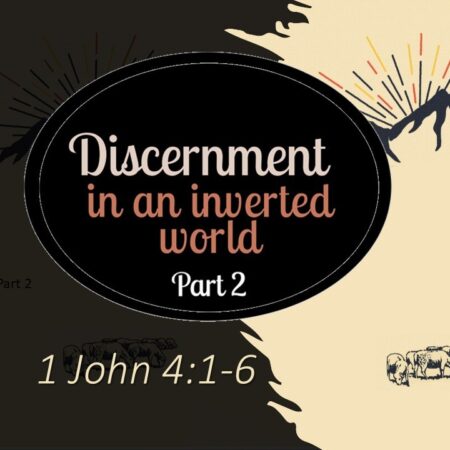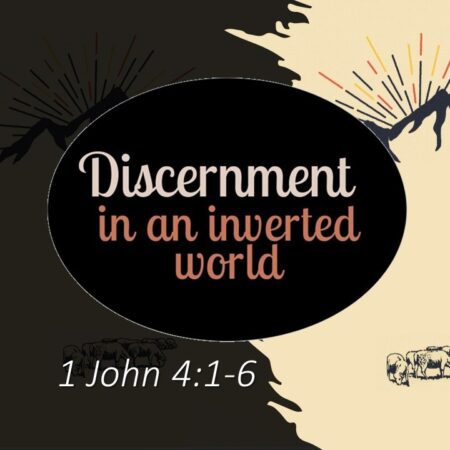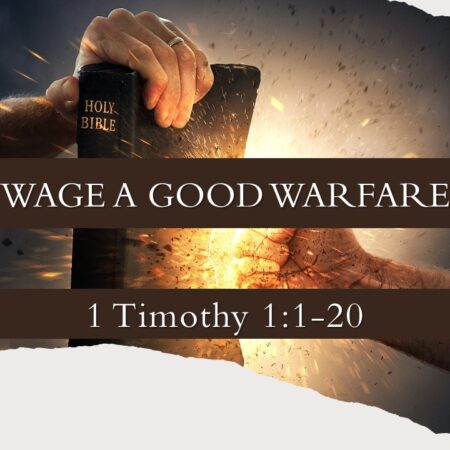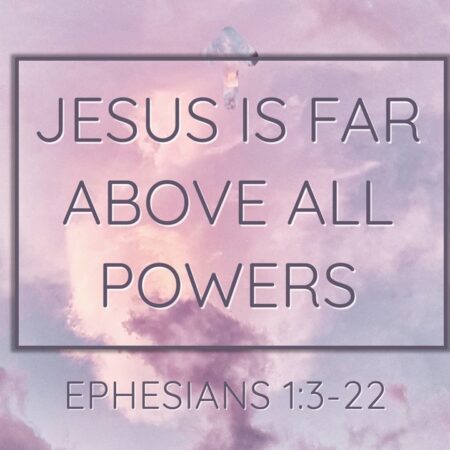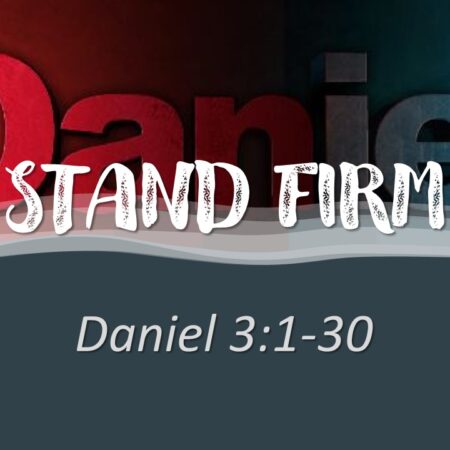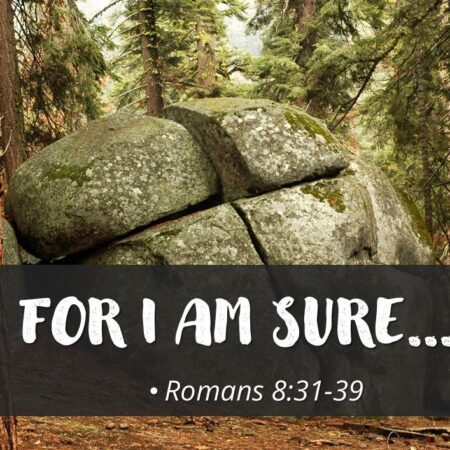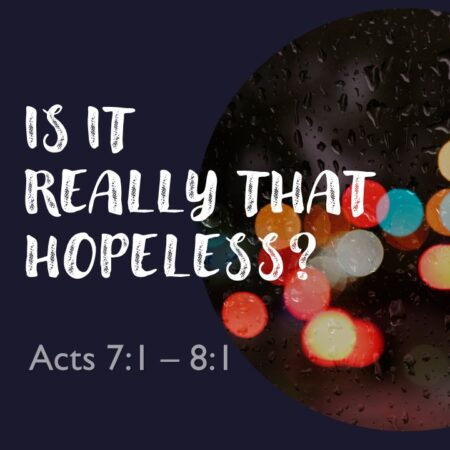Luke 1:5-25 Malachi 4:1-6 Malachi 4:5-6 Chuck Swindoll in his commentary on Luke writes: “Soon they were replaced by lesser men, however, and these compromising leaders held onto the Land…
"Chuck Swindoll" Tagged Sermons (Page 4)
Daniel 3:1-30 John Lennox “Against the Flow” “In chapter 1 and 3 Daniel draws our attention to two parallel yet opposite trends that he had come to observe during his…
1 John 4:1-6 Matthew 24:11 2 Timothy 3:14-16 1 Peter 1:10 Timothy 3:10-17 Ephesians 4:1-16 1 Timothy 4:1 Seven Statements: From Chuck Swindoll’s Living Insights New Testament Commentary (page 108)…
1 John 4:1-6 Quick facts on 1 John: (Swindoll’s Living Insights New Testament Commentary vol.14 Page 10). It was written around AD 90. It was written either in Ephesus or…
1 Timothy 1:1-20 2 Timothy 4:1-5 2 Timothy 3:16-17 2 Timothy 4:3-5 1 Timothy 1:18-19 2 Timothy 4:7-8 Lucado, the teaching minister at Oak Hills Church in San Antonio, Texas…
Chuck Swindoll in his commentary on Malachi writes:
“The people of Judah began to be exiled from the Promised Land in 605 B.C. and returned from Babylon about seventy years later. By the time of Malachi, they had been back in the land for more than a hundred years and were looking for the blessings they expected to receive when they returned.
Though the temple had been rebuilt, the fervor of those early returning Israelites had given way to a thorough apathy for the things of God. This led to rampant corruption among the priesthood and spiritual lethargy among the people.
Malachi came along at a time when the people were struggling to believe that God loved them. The people were focused on their unfortunate circumstances and refused to account for their own sinful deeds.
So, God pointed the finger back at them, and through Malachi, told the people where they had fallen short of their covenant with Him. If they hoped to see change, they needed to take responsibility for their own actions and serve God faithfully according to the promise that their fathers had made to Him on Mount Sinai all those years before.”
In his book ‘DARK AGENDA’ – “The war to destroy Christian America”, author David Horowitz (published 2018) writes:
“Religion must die in order for mankind to live”, proclaims left-wing commentator and comedian Bill Maher in RELIGULOUS, the most watched commentary feature of 2008.
Both title and script were transparent attempts to stigmatize religious people as dangerous morons whose views could not be taken seriously. Through the film, Maher travels to Jerusalem, the Vatican, and Salt Lake City, as well as other centers of religion, interviewing believers and making them appear foolish. How did he gain interviews with his victims? HE LIED TO THEM, SAYING HE WAS MAKING A FILM CALLED ‘A Spiritual Journey.”
According to Maher, “THE IRONY OF RELIGION IS THAT BECAUSE OF ITS POWER TO DIVERT MAN TO DESTRUCTIVE COURSES, THE WORLD COULD ACTUALLY COME TO AN END.” He predicts the destruction of the human race as a result of “religion-inspired nuclear terrorism.” Hence the need for religion to die if mankind is to live. Maher’s views accurately reflect the attitudes of a movement called THE NEW ATHEISM, whose leaders are prominent scientists and best-selling authors, far superior in intellect to Maher but equally contemptuous of religion and religious believers.
Like Maher’s film, the New Atheism movement seeks to discredit all religious belief by caricaturing its adherents as simpletons, and worse. The goal of the New Atheism is to delegitimize and extinguish the religious point of view.”
Most people don’t realize that if God is dead,
THEN EVERYTHING IS PERMITTED, BECAUSE THERE ARE NO GROUNDS FOR CALLING ANYTHING – AN ACT, A STATEMENT, AN EVENT, A CHOICE, EITHER GOOD OR BAD, RIGHT OR WRONG, VALUABLE OR WORTHLESS, IMPORTANT OR UNIMPORTANT.
Richard Dawkins “The God Delusion” (2006)
“Do we know of any……examples where stupid ideas have been known to spread like an epidemic? Yes, by God! Religion. Religious ideas are irrational. Religious believes are dumb and dumber. Religion drives otherwise sensible people into celibate monasteries or crashing into New York skyscrapers. Religion motivates people to whip their own backs, to set fire to themselves or their daughters, to denounce their own grandmothers as witches, or, in less extreme cases, simply to stand or kneel, week after week, through ceremonies of stupefying boredom.”
C.S. Lewis in his book “The Abolition of Man” writes:
“The triumph of personal desire over objective validity as a standard of behavior creates what is tantamount to a moral vacuum into which will rush disordered passions bloated in their abnormal freedom from any constraint.
The three passions are: THE LUST FOR SENSATION, THE LUST FOR MANIPULATIVE KNOWLEDGE, AND THE WILL TO POWER, respectively.
The egotistical will to power and pleasure supersedes any less explicit idea or sentiment of obligation to some criterion or good outside of self.
It assumes that the pleasure of self is the highest good and that life is an aesthetic phenomenon; under such conditions, society becomes a jungle in which eventually a contest for the survival of the fittest can only favor the Nazi, the Hell’s Angel, the robber baron, and the gangsters.”
Chuck Swindoll in his Daily Devotional from December 31, 2020 writes:
“A new year is smiling at us, with twelve months of the unknown. I feel like we’re sitting on the beach, an entire ocean of possibilities, including both sundrenched days and a few storms with howling winds and giant waves, stretched out across the unchartered waters. If you and I let ourselves, we could become so afraid of the potential dangers that we would miss the adventure.
Becoming a couch potato is an option. You’d look toward the horizon, entertain a few thoughts that start with “Someday……” but then lean back and just keep looking and longing. Hawaii would never have been discovered had everyone chosen to sit tight and stay with a sure thing.
Sandwiched between January 1 and December 31 are twelve exciting yet unlived months of opportunities. Challenges brought on by changes await us. We will be shoved out of our comfort zones and required to respond. We can do so positively or negatively, with optimism or with pessimism. Even the familiar beach we have gotten used to is in for some changes, forcing us to leave our “spot” and accept new surroundings. If you are not careful, you’ll be so preoccupied with complaining, you’ll miss your golden moment to grow a little…to make some new discoveries…to switch from being a passive sitter on the beach to becoming an active participant in the adventure beyond the familiar.
Pamela Popper and Shane Prier published a book under the title:
“COVID OPERATION; what happened, why it happened and what’s next”
“The most consequential thing to happen in the world since World War II, this event has been perpetrated by a wide network of enemies of the people who have managed to disguise themselves as public servants,
health professionals, and founders and heads of global non-profits. They are everywhere, they are incredibly rich, they are powerful, and they are intent on getting their way.”
“Scenarios for the Future of Technology and International Development”
The First Scenario is titled: “LOCK STEP” a world of tighter top-down government control and more authoritarian leadership with innovation and growing citizen pushback.”
“The pandemic also had a deadly effect on economies: international mobility of both people and goods screeched to a halt, debilitating industries like tourism and breaking global supply chains. Even locally, normally bustling shops and office buildings sat empty for months, devoid of both employees and customers.
The United States initial policy of strongly discouraging citizens from flying proved deadly in its leniency, accelerating the spread of the virus not just within the U.S. but across borders. However, a few countries did fare better – China in particular. The Chinese government’s quick imposition and enforcement of mandatory quarantine for all citizens, as well as its instant and near-hermetic sealing off of all borders, saved millions of lives, stopping the spread of the virus far earlier in other countries and enabling a swifter post-pandemic recovery.
During the pandemic, national leaders around the world flexed their authority and imposed airtight rules and restrictions, from the mandatory wearing of face masks to body-temperature checks at the entries to communal spaces like train stations and supermarkets. Even after the pandemic faded, this more authoritarian control and oversight of citizens and their activities stuck and even intensified.
In order to protect themselves from the spread of increasingly global problems – from pandemics and transnational terrorism to environmental crisis and rising poverty – leaders around the world took a firm grip on power.”
“At first, the notion of a more controlled world gained wide acceptance and approval. Citizens willingly gave up some of their sovereignty – and their privacy – to more paternalistic state in exchange for greater safety and stability.
In developed countries, this heightened oversight took many forms: biometric ID’s for all citizens, for example, and tighter regulation of key industries whose stability was deemed vital to national interests.”
“Technology in Lockstep is largely driven by government and is focused on issues of national security, health and safety:
Scanners using advanced functional magnetic resonance imaging (fMRI) technology become the norm at airports and other public areas to detect abnormal behavior that may indicate “antisocial intent.”
“Many people might conclude that either the authors of this document had incredible psychic powers or that the document is being used worldwide today as a handbook for decision-making.” “COVID OPERATION by Popper & Prier”
We hear a lot about CCP, the Chinese Communist Party Virus. The Chinese Communist Party is built upon THE COMMUNIST MANIFESTO, written and published by Karl Marx and Fredrick Engel in February 1848.
In this manifesto Marx and Engel advocated the violent destruction of private enterprise, social classes, nations, religions, and the family.
Chuck Swindoll wrote an article with the title: “Don’t Quit”
“There is not an achievement worth remembering that isn’t stained with the blood of diligence and checkered with the scars of disappointment. To quit may feel good now, but it’s a bummer when life’s bills come due. Giving thought to giving up? Considering the possibility of quitting? Looking for an easy way out? Entertaining the idea of running away…stopping before it’s finished…escaping from reality? Admittedly, the holiday season only encourages such feelings of despair. Don’t! Instead, I urge you to draw near to God and to His people. Don’t retreat, but rather surround yourself with loving, supportive friends. And let God be gracious to you. It’s always harder to quit when a few friends stand with you.”
Ryan Holiday is the author of a book titled: “The Obstacle Is The Way”
“There is an old Zen story about a king whose people had grown soft and entitled. Dissatisfaction with this state of affairs, he hoped to teach them a lesson. His plan was simple; He would place a large boulder in the middle of the main road, completely blocking entry into the city. He would then hide nearby and observe their reactions.
How would they respond? Would they band together to remove it? Or would they get discouraged, quit, and return home?
With growing disappointment, the king watched as subject after subject came to this impediment and turned away. Or, at best, tried halfheartedly before giving up. Many openly complained or cursed the king or bemoaned the inconvenience, but none managed to do anything about it.
After several days, a lone peasant came along on his way into town. He did not turn away. Instead he strained and strained, trying to push it out of the way. Then an idea came to him; He scrambled into the nearby woods to find something he could use for leverage. Finally, he returned with a large branch he had crafted into a lever and deployed it to dislodge the massive rock from the road.
Beneath the rock were a purse of gold coins and a note from the king, which said:
“The Obstacle in the path becomes the path. Never forget, within every obstacle is an opportunity to improve our condition.”
As Susan Perlman in an article she wrote for “Jews for Jesus” publication said:
“One might ask, “What do we need pain for? Couldn’t we accomplish the same things with pleasure?”
The answer has to be that in pleasure we focus on ourselves and our feelings and our perceptions, which makes us to be mindful of ourselves and our will to be pleased; whereas pain helps us to focus outside of ourselves, to reach beside ourselves, to find out what’s there. Pleasure tends to make one self-centered, whereas pain tends to make a more noble person, other-centered and, hopefully God-centered.
A crisis becomes an occasion for declension or advance. A self-centered person in a crisis can become more self-centered and wallow in self-pity. God-centered or God-seeking persons can be propelled forward in their quest for meaning.
It is important to know that we are not helpless and we are not hopeless. We can choose to decide how we will deal with pain. We cannot choose whether or not we will have pain, but we can decide whether or not we will ALLOW PROBLEMS TO AFFECT US.
To live is to endure the pressures of life. But we can decide if we are going to let these things press us down or if we are going to let them lift us up.”
David Aikman wrote a book titled” GREAT SOULS” and in it he writes:
“I have always personally been inspired by the lives of great people. It is hard not to be energized by the stories of how individuals have risen above adversity or suffering or have maintained a purity in the face of great temptation. Our age, with its habit of instantly judging a man or woman’s life based on the fragmentary and proverbial sound bite, is often impatient with detail, nuances, depth.”
Chuck Swindoll writes about Joseph:
“Here is one on the list of God’s “greats”…….a life lived for His glory and, equally significant, though he was terribly mistreated, lived high above the all-too-common reactions of rage, resentment, and revenge. Here is one who deliberately chose to overlook unfair offenses, to overcome enormous obstacles, and model a virtue that is fast becoming lost in our hostile age – forgiveness.”
At the outset, Joseph’s life showed little promise – a simple shepherd, twelfth of thirteen children, a dreamer hated by his brothers. So how did he become a man so extraordinary that Moses spent almost fourteen chapters in the Book of Genesis telling his story? Where did Joseph get the qualities of integrity, leadership, and godliness in such measure that they took him from the pit of slavery to prime minister of Egypt?”
Through Joseph
• God explained dreams
• Revealed the future
• Saved Egypt and Israel from starvation
• Demonstrates the depth of love God has for all of us.
Paul is right:
For I am sure that neither death nor life, nor angels nor rulers, nor things present nor things to come, nor powers, not height not depth, nor anything else in all creation, will be able to separate us from the love of God in Christ Jesus our Lord.
The historian Will Durant made this comment:
“There is not greater drama in human record then the sight of a few Christians, scorned and oppressed by a succession of emperors, bearing all trials with a fearless tenacity, multiplying quietly, but building order, while the enemy generated chaos. Fighting the sword with the Word of God, brutality with hope and at last defeating the strongest empire that history has ever known.
Caesar and Christ had met in the arena, and Christ had won.”
Chuck Swindoll in his commentary on these verses writes:
“During the interval of time between our Lord’s departure from the earth and His return, He is involved in two projects. One; to prepare a place for His children. Two; to prepare His children for a place. He is engaged right now in preparing heaven for His own. That’s what’s happening away from our sight. But on this earth, He is also engaged in preparing us for the life we will live in eternity with Him.”



